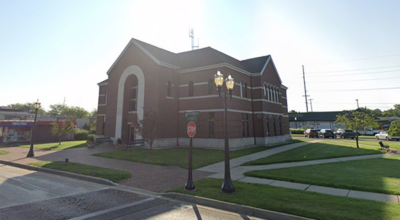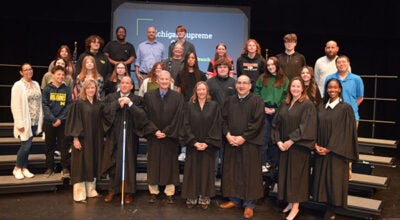Eddies chat with Israel
Published 11:26 pm Wednesday, May 2, 2012
Now Israel knows about Edwardsburg school budget challenges.
Twenty-five sophomore Edwardsburg High School economics students taught by Jeff Kozinski conducted their third videoconference Monday morning with 15 students from Galilee Experimental Municipal School in Nazareth, with which there is a seven-hour time difference.
The April 30 topic was human rights, specifically women’s rights.
“Their school scored the highest in the country on the ACT,” Kozinski said.
The first, “Student Cultural Exchange,” introduced students to each other and to the technology while they shared their own cultures, lives and communities.
The second, “Media and Society,” explored the meaning of civic engagement, social responsibility and the role of media.
The fourth, in two weeks, lets students explore each country’s government in detail and the importance of good citizenship in communities.
EHS applied for a free Youth Talk virtual platform program through Global Nomads Group (GNG) for technology-enhanced, project-based learning.
The Middle East is an important U.S. trade partner. In 2007, exports to Middle East and North African countries grew to $50 billion.
U.S. trade volume with the Middle East reached $158 billion the same year, including $55.6 billion in exports and $102 billion in imports.
At the same time, there is a growing lack of understanding between the United States and the Arab world — especially among young people.
According to a 2006 National Geographic poll, six in 10 young Americans ages 18 to 24 could not find Nazareth on a map. Many Arab youth have limited contact with their U.S. peers, their impressions largely shaped, inaccurately, by television, music and entertainment. Wars in Tunisia, Egypt, Sept. 11 and the ongoing Israeli-Palestinian conflict widen the gap.
“Everyone needs to protect human rights,” Austin Evans said. “If we are against people being treated differently we should stand up and fight for them. We should not rely on the government or anyone else. It should be the community, person by person, standing up for human rights.”
Edwardsburg and Israel reviewed each others’ “word clouds.” Logan Black said, “For our word cloud, we all wrote essays about speaking out and about standing up for what we believe in as citizens of our town and of our country — especially with the problem going around our school with teachers getting laid off and the government taking away money from us. ‘Speak’ is very large because if we want our problems to be solved, we have to let what we believe in be known. Representatives is large, too, because we emailed ours. They are coming to our school today to speak with us about budget cuts. One of our band directors is getting laid off, so students and parents are trying to find a way he can stay. Project Speak Out brings awareness to people in our community and shows them education is important. We want to discourage decreased education spending or the next generation won’t be as good as the last.”
Noah Neuerburg explained, “We have the word ‘Michigan’ because our state is facing a lot of educational budget cuts. In our country, each state is responsible for education.”
Israel, which has no band, addressed language inequality.
Edwardsburg shared an article about how women don’t enjoy pay parity yet with men.







